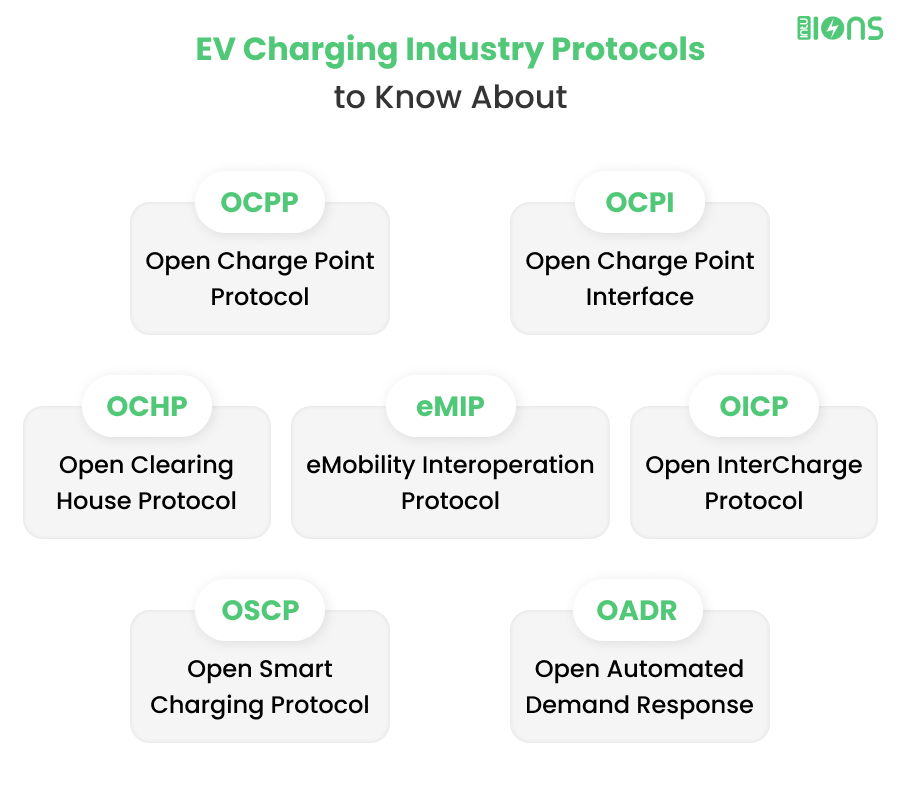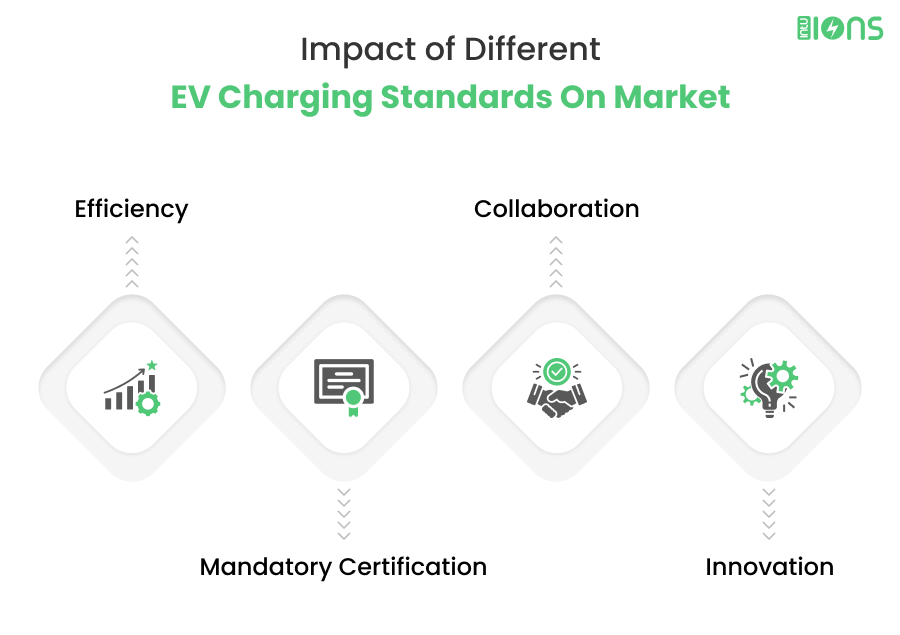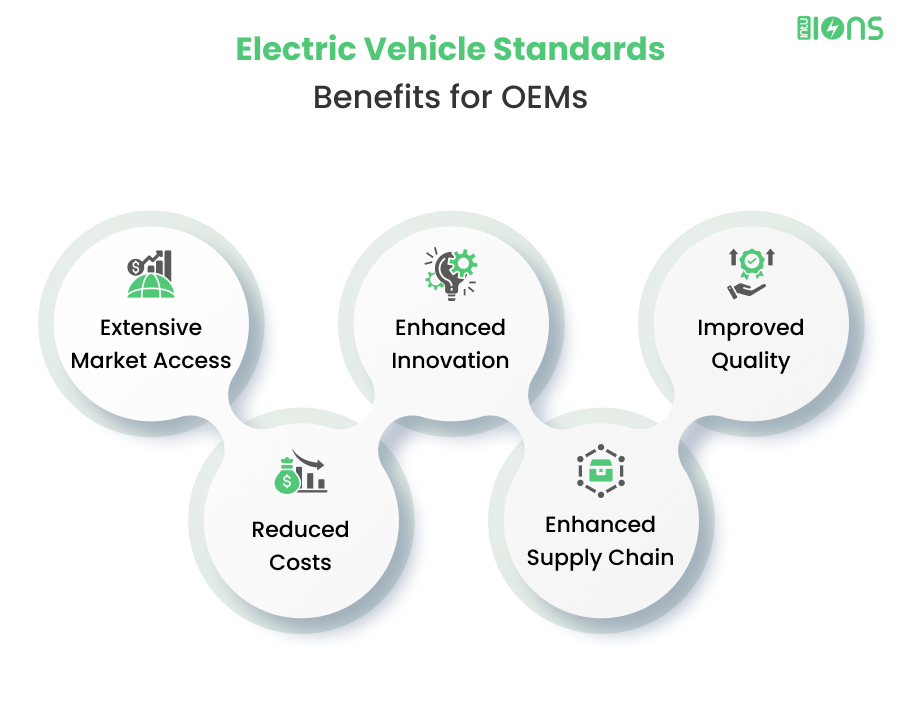Decoding The Jargon: Different Electric Vehicle Charging Standards

The EV market is set to take on the world with its numerous benefits such as reduced greenhouse gas emissions, lower operating costs, quieter operation, instant torque, and improved air quality. But do you know about the different global EV charging ISO standards or the varying EV charging industry protocols? Let us decode the jargon and more in this blog post.
Battery-powered vehicles are rapidly gaining popularity in the automobile sector. Despite the COVID-19 pandemic and supply chain bottlenecks, the Electric Vehicles (EV) market has grown significantly. In 2021, sales of new electric vehicles more than doubled compared to the previous year, with a 51.8% increase, with the US accounting for about 95% of global EV sales.
Besides, the sale of electric cars globally continues to rise strongly in 2022, with 2 million sold in the first quarter, representing a 75% increase compared to the same period in 2021. With major OEMs such as Tesla, Volvo, Vera, and Daimler developing self-driving electric vehicles, we only expect the EV market to proliferate in the future.
Importance of Electric Vehicle charging standards for interoperability and safety
The two factors cannot be overstated enough for the success of the EV market. While interoperability ensures that different EVs and charging stations can communicate and operate with each other – regardless of the manufacturer or region, safety standards are essential for protecting both the EV driver and the charging station infrastructure.
Plus, adhering to these standards reduces the risk of legal liabilities and regulatory issues for manufacturers, operators, and service providers in the EV industry. It increases visibility and credibility in the industry, resulting in higher sales for the stakeholders in the EV market.
Different global EV charging ISO standards
To enable smart charging, it is vital to have standards in place that allow various entities in the electromobility ecosystem to exchange information on factors such as pricing, electricity demand, and the availability of charging stations.
Such communication is necessary to ensure that EVs and charging stations can coordinate and create a charging schedule that meets both the needs of the EV driver and the electricity grid. Many technical standards play a crucial role in facilitating this communication, including:
1. ISO 15118
It is an international standard for bidirectional (Vehicle to Grid or V2G) communications between plug-in electric vehicles and charging stations. ISO 15118 enables advanced charging functionalities, such as automatic billing, charging reservation, and load management.
It is essential for developing innovative grid technologies and integrating renewable energy. Examples of ISO 15118-compliant charging stations include the ABB Terra AC Wallbox and the Siemens VersiCharge.
2. ISO 61851
This is a family of international standards for electric vehicle conductive charging systems. ISO 61851 specifies the requirements for AC and DC charging modes, communication protocols, safety features, and performance metrics, such as charging time and efficiency.
It initiates interoperability between EVs and charging stations from different manufacturers. Examples of ISO 61851-compliant charging stations include the Tesla Supercharger and the ChargePoint Home Flex.
3. ISO 17409
It is an international standard for electric vehicle wireless power transfer (WPT) systems. ISO 17409 defines the specifications for the WPT technology, including the frequency range, power levels, efficiency, and safety requirements.
It is relevant for EVs that require frequent or automated charging, such as autonomous electric taxis or delivery vehicles. Examples of ISO 17409-compliant WPT systems include the WiTricity DRIVE system and the Qualcomm Halo system.
4. ISO 19363
This is an international standard for the charging infrastructure for electric road vehicles. It covers the requirements for the installation, operation, and maintenance of EV charging stations, as well as the safety and environmental aspects.
ISO 19363 is important for ensuring the reliability, quality, and safety of the charging infrastructure, especially in public spaces. Examples of ISO 19363-compliant charging stations include the EVBox BusinessLine and the Enel X JuicePump.
5. ISO 21848
It is an international standard for testing and validating electric vehicle components, including batteries, charging systems, and power electronics. ISO 21848 defines the methods, procedures, and performance criteria for conducting various tests, such as thermal, mechanical, electrical, and environmental.
It helps ensure the safety, durability, and quality of EV components, especially in high-stress conditions. Examples of ISO 21848-compliant testing facilities include the VTT Battery Test Laboratory and the Intertek EV Powertrain Testing Center.
6. ISO 26262
ISO 26262 covers the entire lifecycle of safety-critical components, from design to decommissioning, and defines the processes, methods, and requirements for ensuring safety integrity levels (SILs).
It is essential for ensuring the safety and reliability of EV components, especially in autonomous and connected vehicles. Examples of ISO 26262-compliant EV components include the Bosch Electric Power Steering system and the Aptiv Advanced Driver Assistance Systems.
7. ISO 12405
It is an international standard for testing the electrical safety and performance of electric and hybrid electric vehicle components, such as batteries and charging systems. ISO 12405 defines the testing procedures, requirements, and acceptance criteria for various performance metrics, such as energy efficiency, power output, and durability.
It is vital for ensuring the safety and quality of EV components, especially in high-voltage applications. Examples of ISO 12405-compliant testing facilities include the UL Battery and Energy Storage Technology Center and the TÜV Rheinland EV Charging Station Testing Center.
EV charging industry protocols to know about
Open protocols are sets of rules and guidelines that ensure seamless communication and data exchange between various entities in the EV industry. They are practical tools for achieving widespread interoperability among industry stakeholders’ systems, facilitating EV adoption, reducing operating costs, and developing scalable, future-proof infrastructure.
We have compiled a list of different Electric Vehicle charging standards that provide the necessary flexibility for the entire market. These standards and protocols are expected to be a significant driver of future EV charging infrastructure developments.
1. Open Charge Point Protocol (OCPP)
OCPP is a globally recognized communication standard utilized between charging stations and the back-end systems of charge station operators. This protocol is responsible for managing charging data transmission and exchanging vital information between electric vehicles, scooters, and the electricity grid.
2. Open Smart Charging Protocol (OSCP)
OSCP is an open communication protocol that allows for seamless communication between a charge point and energy management systems. It offers a 24-hour forecast of the available capacity of an electricity grid. The Open Charge Alliance (OCA), which comprises private and public EV infrastructure leaders, oversees both OCPP and OSCP.

3. Open Charge Point Interface (OCPI)
OCPI is a system that facilitates automated roaming for EV drivers across multiple charging networks. It provides essential data such as location, accessibility, and pricing of charge stations, while also considering real-time billing and mobile access. The EVRoaming Foundation maintains the OCPI protocol, ensuring its widespread availability at no cost.
4. OpenADR
OpenADR is an open, secure, and two-way information exchange model that enables automated demand response (DR) actions, balancing grid supply and demand or mitigating high electricity costs.
Its main goal is to promote the usage and advancement of OpenADR standards, which enable a consistent exchange of dynamic price and reliability signals between energy management and control systems, utility companies, and system operators during DR events.
Considering their potential for demand response, aggregated EV charging loads are expected to become seamlessly integrated into modern smart grids.
5. Open Clearing House Protocol (OCHP)
OCHP is an open-source protocol that authorizes communication between a charging management system and a clearinghouse system simply and uniformly. It enables seamless electric vehicle charging across charging station networks, known as e-Roaming.
eMobility service providers can use OCHP to connect to EV charging operators and providers, providing access to their network.
6. Open InterCharge Protocol (OICP)
OICP was developed by Hubject and is an implemented communication standard between e-mobility service provider (EMSP) and charge point operator (CPO) systems through the Hubject platform.
The protocol enables information exchange based on contractual relationships between EMSPs and CPOs to Hubject, allowing for reliable roaming for electric car drivers.
7. eMobility Interoperation Protocol (eMIP)
eMIP enables roaming of charging services via a charge authorization and a data clearinghouse API. It gives access to an extensive charging point database. eMIP allows for seamless communication and data exchange between charging point operators and mobility service providers, ensuring easy and reliable access for EV drivers.
IEC standards for EVs
The International Electrotechnical Commission (IEC) is responsible for creating global standards about electrical, electronic, and related technologies and covers various aspects such as product development, performance, compatibility, and environmental safety to ensure that EV products are safe and compatible with each other. Let us study the IEC standards in detail:
1. IEC 61851
This comprises international standards pertaining to EV conductive charging systems. It specifies the requirements for AC and DC charging modes, communication protocols, safety features, and performance metrics, such as charging time and efficiency. IEC 61851 ensures interoperability between EVs and charging stations from different manufacturers.
2. IEC 62196
IEC 62196 is a set of international standards for EV connectors, also known as charging plugs or sockets. It specifies the mechanical, electrical, and functional characteristics of the connectors for AC and DC charging modes, ensuring a safe and reliable connection between the charging station and the EV.
3. IEC 62752
IEC 62752 is an international EV supply equipment (EVSE) standard with an integrated residual current device (RCD). It defines the requirements for the design, testing, and certification of EVSE with an RCD, a safety feature that protects against electric shock and current leakage. IEC 62752 ensures the safety and reliability of EV charging infrastructure.
4. IEC 63110
IEC 63110 standardizes EV wireless power transfer (WPT) systems. It specifies the technical requirements for the WPT technology, including the frequency range, power levels, efficiency, and safety requirements. IEC 63110 is relevant for EVs that require frequent or automated charging, such as autonomous electric taxis or delivery vehicles.
5. IEC 60364
IEC 60364 ensures electrical installations in buildings, including those used for EV charging. It covers electrical system design, installation, and maintenance, ensuring safety, reliability, and energy efficiency. IEC 60364 enables the seamless and safe integration of the building’s electrical system.
How will the different Electric Vehicle charging standards impact the market?
Different standards can result in a fragmented market where consumers must choose between vehicles with different charging standards. Here is how the protocols impact the EV market:
1. Efficiency
EV standards help improve the efficiency of EVs and charging infrastructure by promoting standardized technologies and communication protocols. This can reduce costs and increase the speed of EV adoption, making it more economically feasible for consumers and businesses to switch to EVs.
2. Innovation
EV standards drive innovation in the EV industry by encouraging the development of new technologies and practices that meet the standard requirements. This can result in new business opportunities and further advancements in the EV market, such as developing new charging technologies and infrastructure.

3. Certification
EV standards often require mandatory certification, which can ensure that EVs and charging infrastructure meet the required standards for safety, performance, and reliability. This makes the EV market more dependable and trustworthy for consumers and businesses.
4. Collaboration
Implementing EV standards requires constant collaboration among industry stakeholders, including EV manufacturers, charging station operators, and governments. This collaboration is necessary to ensure that the standards continue evolving to meet the market’s changing needs and promote the widespread adoption of EVs.
How different Electric Vehicle standards benefit OEMs
By embracing these standards, OEMs can position themselves for success in the rapidly growing EV market. Here are the advantages of varying EV charging standards for OEMs:
1. Reduced costs
EV standards can help minimize business expenses for OEMs by promoting standardized components, technologies, and communication protocols. This leads to economies of scale and lower costs for manufacturing and maintenance.
Using standardized components, OEMs can minimize the need for custom parts and decrease the time and resources required for product development and testing.
2. Improved quality
EV standards promote quality and safety requirements that OEMs must follow to ensure their products meet industry standards, which improves customer satisfaction and increases market share. By complying with EV standards, OEMs can demonstrate their commitment to safety and quality, enhancing their reputation and building trust with their customer base.
3. Enhanced innovation
EV standards drive innovation in the EV industry by encouraging the development of new technologies and practices that meet the requirements of the standards. OEMs building new products that meet the standards can gain a competitive advantage. This results in an increased market share and revenue for OEMs.

4. Extensive market access
Many governments and organizations require compliance with specific EV standards for participation in EV programs and initiatives, such as tax incentives or grants. OEMs can access these programs and expand their customer base by complying with these standards.
5. Enhanced supply chain
EV standards optimize the supply chain for OEMs through standardized components and technologies. This can lead to more reliable and efficient supply chains, reducing the risk of delays and disruptions in production. Using standardized components, OEMs can also reduce the risk of supply chain issues related to the availability of custom or proprietary parts.
Over to you
It is crucial to keep up with the latest different Electric Vehicle standards to ensure modern and future-proof EV charging infrastructure.
To integrate e-mobility into the electricity grid through evolving digital communication technologies, smart charging standards must be continuously updated. This is critical to ensuring the long-term viability of investments in a rapidly evolving market.
Come, let us accelerate the world’s shift towards sustainable transportation and build a revolutionary software platform apt for EV charger OEMs like yourself. To find out more, book a free consultation with Intuions experts.
